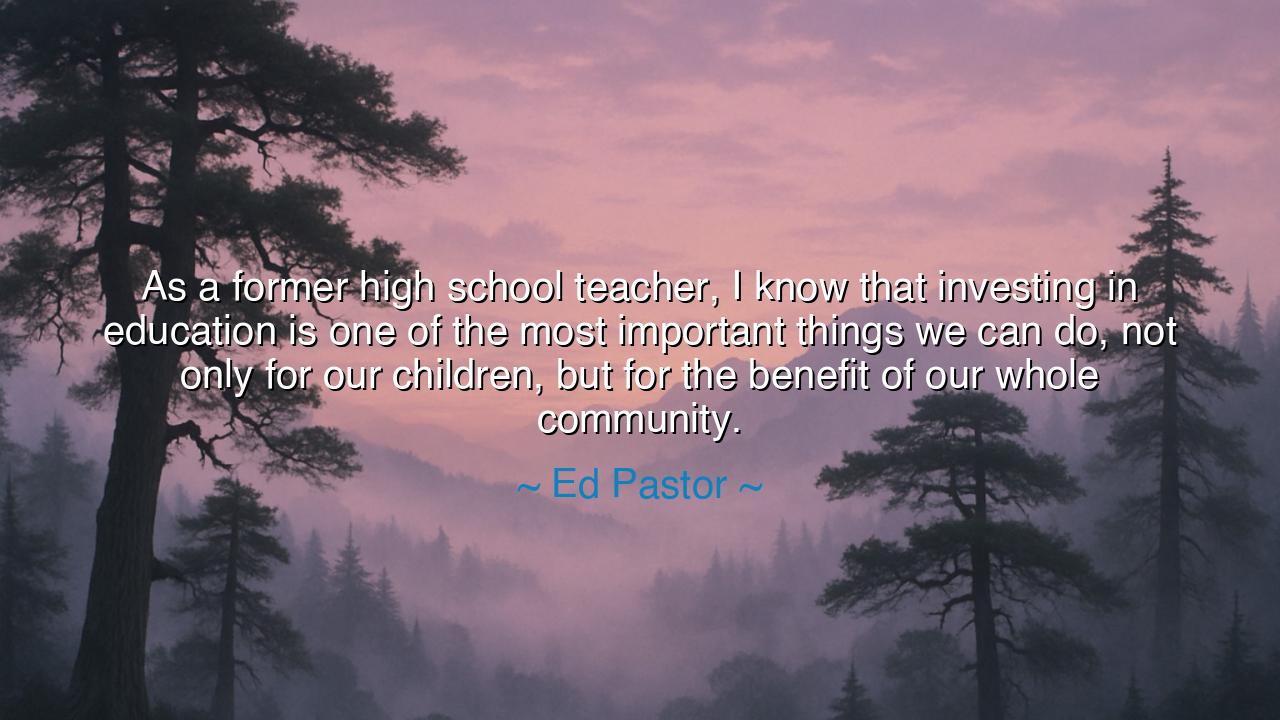
As a former high school teacher, I know that investing in
As a former high school teacher, I know that investing in education is one of the most important things we can do, not only for our children, but for the benefit of our whole community.






Ed Pastor, a man who once stood before the classroom and later served his people as a statesman, proclaimed with clarity: “As a former high school teacher, I know that investing in education is one of the most important things we can do, not only for our children, but for the benefit of our whole community.” These words rise like a bell across generations, reminding us that the seed sown in the hearts of the young yields fruit not only for the individual, but for the entire society. For education is not merely a private gain—it is the foundation upon which communities flourish or falter.
The origin of this insight is Pastor’s dual life: first as a teacher, witnessing the hunger and struggles of youth in the classroom, and later as a leader, shaping policies that reached far beyond the schoolyard. Having walked both paths, he understood that the fate of a community rests upon the cultivation of its young minds. In the classroom he saw potential; in public service he saw how the neglect of that potential leads to poverty, division, and decline. Thus his words carry the weight of lived experience, not theory alone.
History itself bears witness to this truth. Consider Athens in the golden age, where investment in learning produced philosophers, artists, and leaders whose influence echoes to this day. Contrast this with societies that scorned the training of the young, where ignorance spread like disease, and corruption devoured the strength of the people. More recently, in the United States, the GI Bill after World War II stands as a testament: when education was extended to returning soldiers, it lifted not only individuals but entire communities, igniting decades of prosperity. These examples show that education is not charity; it is the most enduring form of wealth.
The emotional force of Pastor’s words lies in his vision of community. He reminds us that when a child learns, it is not only that child who benefits. The knowledge gained becomes service to neighbors, innovation in business, healing in hospitals, and justice in courts. To educate the young is to weave a fabric of strength that shelters all. Neglecting education, by contrast, leaves holes in this fabric—holes that widen into despair, crime, and division. Thus, education is not the concern of families alone, but of every citizen who shares in the destiny of a people.
There is also a quiet heroism in Pastor’s words, for he dignifies the teacher as a builder of nations. In a world that often measures worth by wealth or power, he reminds us that the true foundation of greatness lies in the humble classroom, where a teacher’s encouragement may alter the course of a life. Many who have risen to greatness—scientists, leaders, poets—trace their path back to one teacher who believed in them. In this way, the classroom becomes a forge of heroes, though its work is often unseen.
The lesson is clear: if you would strengthen your people, invest in education. This does not only mean funding schools, but also honoring teachers, encouraging children, and creating spaces where learning thrives. It means seeing the young not as burdens, but as the promise of the future. To give them knowledge is to give them freedom, dignity, and power to serve. To withhold it is to betray them, and in betraying them, to betray the community itself.
Practically, this teaching calls us to action: support schools in your neighborhood, encourage the teachers who labor often without recognition, and take an active part in the education of the young, whether they are your children or not. Read to them, listen to their questions, guide them with patience. For in doing so, you invest not only in their lives, but in the strength of the society you leave behind.
Thus Ed Pastor’s words endure as a clarion call: education is the seed of community prosperity. To invest in it is to build a future strong and enduring. To neglect it is to invite decay. Carry this wisdom, O seeker, and let your efforts sow knowledge wherever you walk, for in teaching and in learning lies the survival, the greatness, and the immortality of your people.






AAdministratorAdministrator
Welcome, honored guests. Please leave a comment, we will respond soon